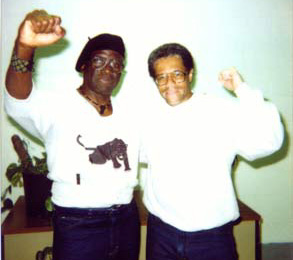(Below, reprinted in full, is a new Amnesty International statement that has just been released. --Reprinted by Angola 3 News)
AMNESTY INTERNATIONAL
PUBLIC STATEMENT
AI index: AMR 51/019/2013
16 April 2013
An Injustice Compounded
Amnesty International demands an end to the cruel and inhuman treatment of Albert Woodfox and Herman Wallace
On the anniversary of the forty-first year since they were placed in prolonged isolation in Louisiana prisons, Amnesty International demands that Louisiana authorities immediately transfer Albert Woodfox and Herman Wallace to a less restrictive prison setting.
Four decades of being held for 23 hours a day in small, stark cells with no group activities, rehabilitative programming or work is cruel, inhuman and degrading treatment in violation of international human rights treaties to which the US is a party.
The injustice of being held under such cruel conditions is compounded by the serious legal concerns that have emerged in their cases over many years of litigation. These concerns suggest that within the state of Louisiana, access to justice may not be a right afforded to all.
Albert Woodfox and Herman Wallace were charged in 1972 with the murder of Brent Miller, a prison guard in Louisiana State prison. The men were convicted in separate trials in front of all white juries. The convictions relied largely on the testimony of one inmate, Hezekiah Brown, who claimed to have witnessed both men commit the crime. Over the years evidence has emerged that this testimony was ‘bought’ by officials who rewarded Hezekiah Brown with weekly rations of cigarettes, living quarters in a cottage on the prison grounds, and by lobbying on his behalf for a pardon – which he eventually received.
This discredited testimony, alongside other issues (including the lack of physical evidence linking the men to the crime and the retraction of more witness testimony) appears to corroborate the claims by Albert Woodfox and Herman Wallace that they were innocent of the crime.
Albert Woodfox has had his conviction for murder overturned three times, most recently in February of 2013 due to a finding of racial discrimination in the selection of his grand jury foreperson. Previously, judges have cited racial discrimination, prosecutorial misconduct, inadequate defence, and suppression of exculpatory evidence.
In 2006, a State Judicial Commissioner recommended a reversal of Herman Wallace’s conviction citing the evidence of prosecutorial misconduct. His case is now before the federal courts.
The Louisiana Attorney General has recently stated his intention to appeal the February ruling by the district federal judge that overturned Albert Woodfox’s conviction. Amnesty International is urging the Attorney General to let the ruling stand so that Albert Woodfox may be given a retrial or set free.
While Albert Woodfox and Herman Wallace continue their long wait for justice, the Louisiana authorities must immediately address the cruelty of the prison conditions the men have now endured for more than four decades.
 |
| Herman Wallace (left) with Albert Woodfox (right) |
AMNESTY INTERNATIONAL
PUBLIC STATEMENT
AI index: AMR 51/019/2013
16 April 2013
An Injustice Compounded
Amnesty International demands an end to the cruel and inhuman treatment of Albert Woodfox and Herman Wallace
On the anniversary of the forty-first year since they were placed in prolonged isolation in Louisiana prisons, Amnesty International demands that Louisiana authorities immediately transfer Albert Woodfox and Herman Wallace to a less restrictive prison setting.
Four decades of being held for 23 hours a day in small, stark cells with no group activities, rehabilitative programming or work is cruel, inhuman and degrading treatment in violation of international human rights treaties to which the US is a party.
The injustice of being held under such cruel conditions is compounded by the serious legal concerns that have emerged in their cases over many years of litigation. These concerns suggest that within the state of Louisiana, access to justice may not be a right afforded to all.
Albert Woodfox and Herman Wallace were charged in 1972 with the murder of Brent Miller, a prison guard in Louisiana State prison. The men were convicted in separate trials in front of all white juries. The convictions relied largely on the testimony of one inmate, Hezekiah Brown, who claimed to have witnessed both men commit the crime. Over the years evidence has emerged that this testimony was ‘bought’ by officials who rewarded Hezekiah Brown with weekly rations of cigarettes, living quarters in a cottage on the prison grounds, and by lobbying on his behalf for a pardon – which he eventually received.
This discredited testimony, alongside other issues (including the lack of physical evidence linking the men to the crime and the retraction of more witness testimony) appears to corroborate the claims by Albert Woodfox and Herman Wallace that they were innocent of the crime.
Albert Woodfox has had his conviction for murder overturned three times, most recently in February of 2013 due to a finding of racial discrimination in the selection of his grand jury foreperson. Previously, judges have cited racial discrimination, prosecutorial misconduct, inadequate defence, and suppression of exculpatory evidence.
In 2006, a State Judicial Commissioner recommended a reversal of Herman Wallace’s conviction citing the evidence of prosecutorial misconduct. His case is now before the federal courts.
The Louisiana Attorney General has recently stated his intention to appeal the February ruling by the district federal judge that overturned Albert Woodfox’s conviction. Amnesty International is urging the Attorney General to let the ruling stand so that Albert Woodfox may be given a retrial or set free.
While Albert Woodfox and Herman Wallace continue their long wait for justice, the Louisiana authorities must immediately address the cruelty of the prison conditions the men have now endured for more than four decades.
No comments:
Post a Comment
Note: Only a member of this blog may post a comment.